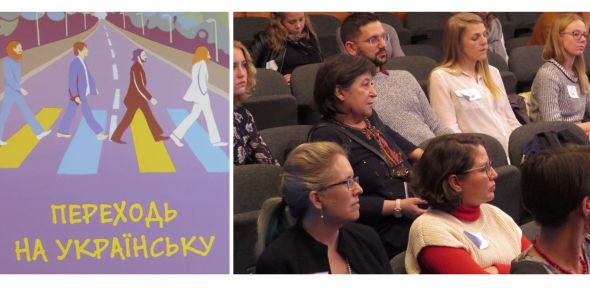
On 19 October 2018, Cambridge hosted the international conference Engaging Multilinguality: Language, Identity and National Cohesion in Ukraine, which was funded by the AHRC-funded project Multilingualism: Empowering Individuals, Transforming Societies (MEITS) with support from Cambridge Ukrainian Studies. Convened by Rory Finnin and Ivan Kozachenko, the conference sought to examine language diversity in Ukraine from a host of disciplinary perspectives.
Academic discussions about language politics in Ukraine tend to centre on questions of linguistic space rather than linguistic subject – on the multilingualism of Ukrainian territory rather than the 'multilinguality' of a Ukrainian citizen. This predominant approach often invites tired exchanges about Ukrainophone-Russophone, west-east regional divisions, which the Maidan Revolution and the ongoing Russian-Ukrainian armed conflict have urgently called into question.
The conference Engaging Multilinguality accordingly sought to direct more attention to the position of the multilingual subject in Ukrainian society – past, present and future. It did so by way of three panels that brought together an international team of scholars hailing from different disciplines and researching different historical periods.
The first panel explored relationships between nation, state and language. Timofey Agarin (Queen’s University Belfast) addressed the dynamics between the state and society and focused on the question of language policy, using Latvia as a comparative case study. Taras Koznarsky (University of Toronto) explored the figure of nineteenth-century Ukrainian poet and folklorist Mykola Markevych and, using Delueze and Guattari’s concept of ‘minor literature’, examined the play of Russian-Ukrainian bilingualism in his work. Olenka Bilash (University of Alberta) reviewed the fascinating findings of her recent study of language use at Ukrainian universities since the Euromaidan Revolution.
The second panel focused predominantly on language use and on changes of linguistic identities in the context of post-Euromaidan Ukraine. Special attention was paid to social media as a new space where various discourses on languages emerge and new linguistic identities are asserted. Natalia Kudriavtseva (Kherson National Technical University) presented findings from her survey of schools in southern Ukraine, which revealed a wide range of language ideologies towards Ukrainian and Russian. Volodymyr Kulyk (National Academy of Sciences of Ukraine) addressed the dynamic nature of social media discourses on languages, language policies and identities, with a particular focus on Facebook. Laada Bilaniuk (University of Washington) examined the fascinating phenomenon of ‘linguistic conversion’ – whereby, for instance, a Russian-speaker makes the conscious decision to switch and commit to the Ukrainian language – that has increased since the advent of Russian military aggression toward Ukraine in 2014.
The third and final panel adhered to the multidisciplinary format of the conference with an emphasis on cultural production across the centuries. Myroslav Shkandrij (University of Manitoba) highlighted a wide range of approaches to understanding and representing the multilinguality of twentieth-century Ukrainian writers. Vitaly Chernetsky (University of Kansas) focused on the role and function of Soviet and post-Soviet Ukrainian cinema in accommodating (or not accommodating) multilingualism. Alina Zubkovych (Södertörn University) considered the language use of the Crimean Tatars, who are one of Ukraine’s largest national minorities, and paid particular attention to developments since the Russian annexation of Crimea in 2014.
An audience of over 70 registrants engaged the speakers in stimulating Q & A sessions over the course of the day. Papers from the conference will be fashioned into articles to be published in a special issue of the Journal of Soviet and Post-Soviet Politics and Society in 2019. In the coming months, excerpts from presentations will be made available as instalments in our Cambridge Ukrainian Studies podcast series.




